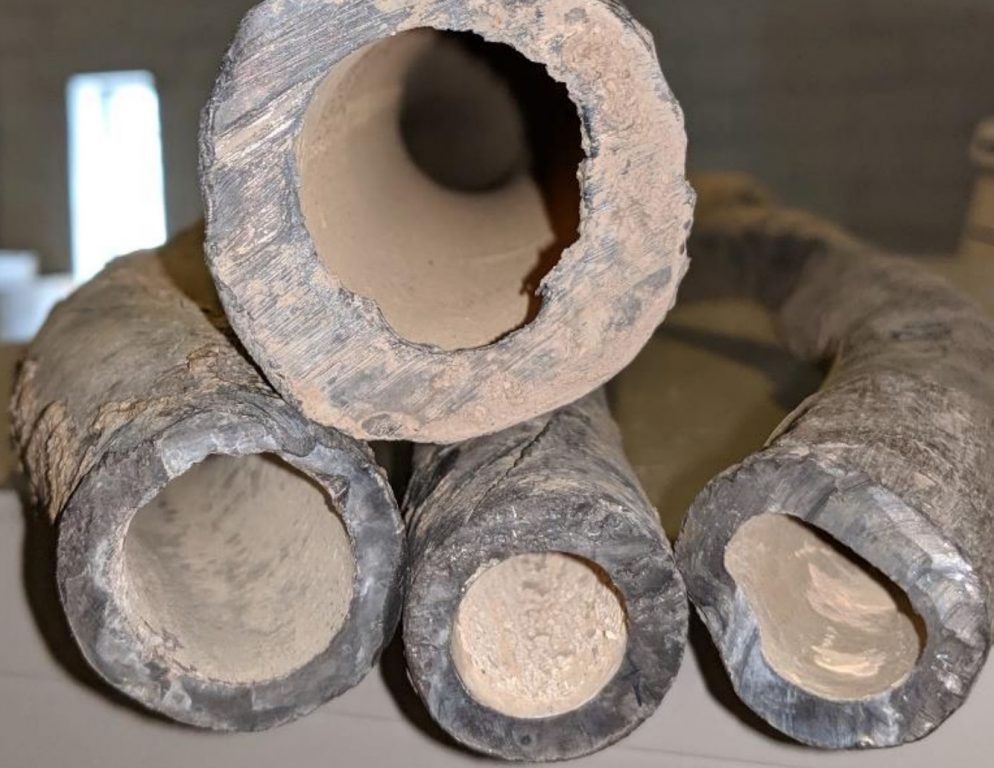Baldwin Pushes for Action on Lead Poisoning
Urges Centers for Medicare and Medicaid Services to improve lead screening data.

Lead service lines replaced by the Milwaukee Water Works with corrosion control visible in pipe. Image from Milwaukee Water Works.
Sen. Tammy Baldwin is joining 16 Senate colleagues in calling on the Centers for Medicare and Medicaid Services (CMS) to tackle the looming issue of childhood lead exposure. The Senators sent a letter to Sema Verma, administrator for CMS, calling for renewed efforts to address issues in lead screening data.
Current federal law requires lead screenings as “appropriate for age and risk factors,” during the enrollment process for Medicaid. Sen. Baldwin and her colleagues, however, feel screenings at 12 months and 24 months of age are not enough.
“Childhood lead exposure remains a serious public health challenge for communities across the country,” the Senators wrote. “With Medicaid serving as an essential health coverage source for the nation’s children, the Centers for Medicare and Medicaid Services plays a critical role in the prevention, screening, and treatment of children affected by lead exposure.”
The letter posed seven questions to CMS revolving around exactly what it is doing, or plans to do, in order to improve lead screening data.
Lead exposure in children remains a key concern for families both in urban and rural parts of Wisconsin. Residents in Milwaukee have implored city officials to fund lead lateral replacement programs, sometimes to little effect. Nevertheless, the state legislature continues to explore ways to mitigate water pollution and contamination. Gov. Tony Evers declared 2019 the Year Of Clean Drinking Water in the state, and his administration has drafted new policies to safeguard clean water.
The Environmental Protection Agency (EPA) also recently updated its rules for lead and copper contamination in water. Although advocates say the rule change was decades in the making and an important step forward, it still may not go far enough.
Childhood lead poisoning can lead to a variety of physical and psychological effects, including learning difficulties, behavioral disorders and poor physical health. The Department of Natural Resources estimates that it would cost $2 billion to replace Wisconsin’s 200,000 lead service lines.
“We write to receive an update on the steps CMS is taking to address demonstrated gaps in data pertaining to blood lead level screenings,” the Senators wrote. The legislators “urge CMS to renew its commitment to ensuring appropriate lead screening for children at risk of lead exposure.” The senators have given CMS until November 30 to respond to their letter.
Reprinted with permission of Wisconsin Examiner.
More about the Lead Crisis
- Rep. Madison Proposes Restoring Local Control Over Lead Inspections - State Rep. Darrin Madison - Jan 6th, 2026
- $43 Million Later, MPS Says Classrooms Are Safe From Lead Dust - Corrinne Hess - Dec 18th, 2025
- MPS Buildings Cleared of Lead-Paint Risks after 10-Plus Months of Work - Milwaukee Public Schools - Dec 17th, 2025
- Wisconsin Moves to Require Lead Service Lines Replaced By 2037 - Danielle Kaeding - Dec 11th, 2025
- Gov. Evers, DNR Announce More Than $159 Million to Ensure Clean, Safe Drinking Water for Wisconsinites in 29 Municipalities - Gov. Tony Evers - Dec 10th, 2025
- EPA Announces $3 Billion in New Funding for States to Reduce Lead in Drinking Water - U.S. Environmental Protection Agency - Nov 25th, 2025
- Wisconsin Communities Get $282 Million for Drinking Water Projects - Danielle Kaeding - Nov 19th, 2025
- MKE County: County Launches Lead Abatement Program - Graham Kilmer - Nov 9th, 2025
- Milwaukee County Launches Lead Remediation Program to Reduce Lead-Based Paint Hazards in Homes in Suburban Communities - David Crowley - Nov 5th, 2025
- Wisconsin Improves Child Lead Testing Rates, Urges Continued Testing and At-Home Prevention - Wisconsin Department of Health Services - Oct 21st, 2025
Read more about Lead Crisis here





















